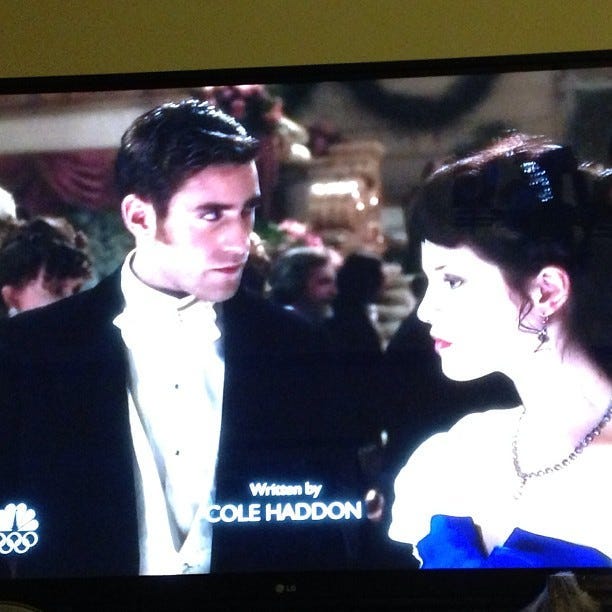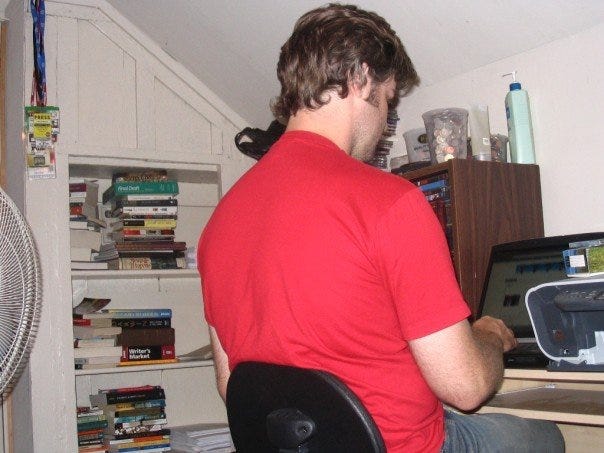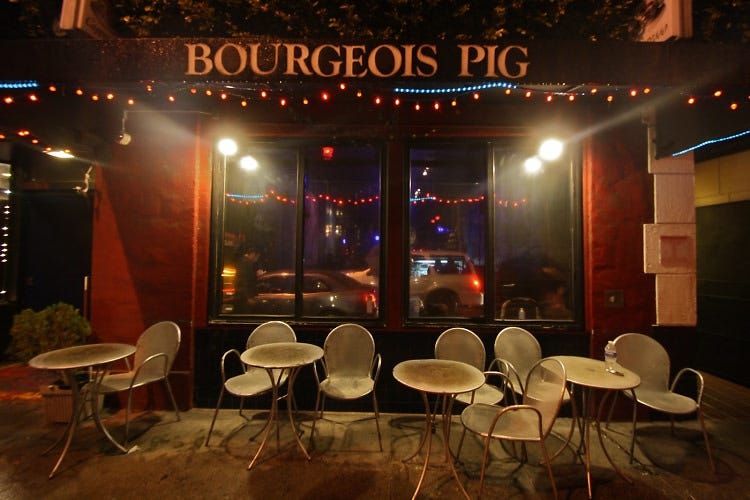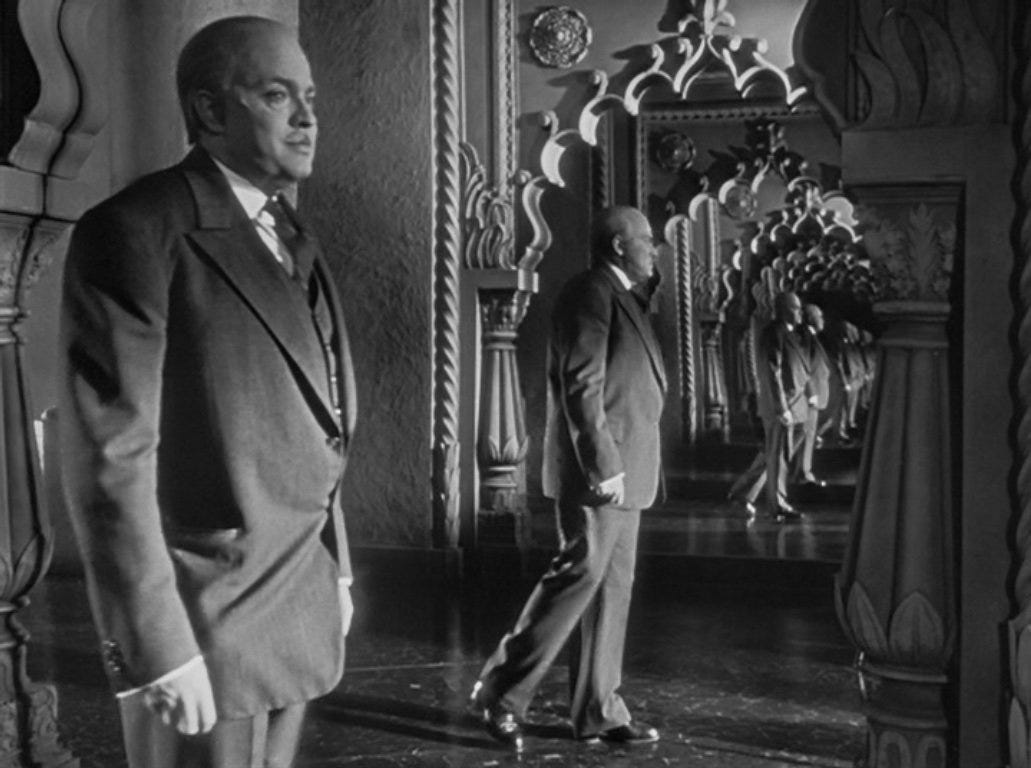What a Coffee Shop Taught Me about Screenwriting (and Life)
A Hollywood coffee shop, popular with screenwriters, taught me many lessons about the importance of community in a deeply competitive industry.
Let’s talk about some of the screenwriters I met early in my life in Hollywood and, in doing so, illustrate what kind of screenwriter I believe you shouldn’t want to be. This is a story about compassion, support, and community.
I arrived in Los Angeles in September of 2005, having crossed the country during the height of summer in a Kia that had said adios to air conditioning somewhere around Illinois. I moved in with three hipsters in an Echo Park Craftsman, and promptly (read: incompetently) started chasing my dream of writing films and television. What an awkward, intimidating time.
Step one, I was advised by one of my hipster roommates: find a coffee shop to write in. But, like, a cool coffee shop. Where cool people go to do things like drink coffee, catch glimpse of celebrities who also like to drink coffee, and commiserate with other screenwriters similarly chasing their dreams.
After a bit of experimentation on locales, I settled on the Bourgeois Pig on Franklin Avenue (which, sadly, closed last year).
It was dark inside, a refuge from the relentless LA sun I didn’t enjoy at all. The bohemian vibe immediately welcoming, even inspiring, with lots of corners to get lost in, a bar you could chat up the baristas from, and a pool table that, in my three years regularly writing there, I never once witnessed someone use as anything other than something to lean against.
People weren’t at the Pig to play games, it felt like. They were there to create.
While others sat hunched over their laptops, tap-tap-tapping away in-between sips from their lattes, this LA newbie found himself yearning for conversation. Problem, though: none of these (mostly working) screenwriters wanted to talk. Even about what they were working on, which most screenwriters won’t shut up about.
“Hey, sorry to bother you. We’ve worked across from each other, like, ten times this month. I’m Cole.”
“Cool, man.”
“I’m a screenwriter.”
“Yeah, we all are.”
I had variations of this conversation many times with people who were “too cool for school”, as other friends called this behavior.
Side note: conversations with celebrities who visited the Bourgeois Pig always felt easy by comparison. My two favorite chats while sitting at the bar were with Michael Peña and the goddess known as Jennifer Coolidge (who is as delightful as you’d hope she’d be).
Meanwhile, I had made a screenwriter friend outside of the Bourgeois Pig, which appeared to be turning into a real friendship. This writer’s career was rapidly exploding, and I was more than a bit dazzled by their success. Then, I made the mistake of asking for advice on a writing deal I’d been offered — my very first offer!
A wall suddenly went up.
I was made to feel as if I was trying to take advantage of this screenwriter. It was how many writers I met at the Bourgeois Pig made me feel, too. In their defense, I was very green at the time — maybe too earnest (I still am) — and in Hollywood, everyone wants something.
Then, this article appeared in the LA WEEKLY: I Will Not Read Your F*%!ing Script. It was (in/famously) written by Josh Olson, the Academy Award-nominated screenwriter of A HISTORY OF VIOLENCE.
He also wrote at the Bourgeois Pig, often across from me.
Here’s the opening of Olson’s “I Will Not Read Your F*%!ing Script”:
I will not read your fucking script.
That’s simple enough, isn’t it? “I will not read your fucking script.” What’s not clear about that? There’s nothing personal about it, nothing loaded, nothing complicated. I simply have no interest in reading your fucking screenplay. None whatsoever.
Ouch.
I can tell you every word of this article is true. It is torture to be asked to read scripts by screenwriters who aren’t “there” yet. It’s a request all professional screenwriters dread, in fact. But here’s the thing: I was that unpolished screenwriter once. Any successful screenwriter was, including Olson and every other professional screenwriter I know.
It rarely takes more than a page to recognize that you’re in the presence of someone who can write, but it only takes a sentence to know you’re dealing with someone who can’t.
Fair enough, man. But even great screenwriters needed smart, thoughtful readers and feedback to become successful. They weren’t hatched into this cold, unfeeling universe fully formed and ready to kick screenwriting ass.
Olson’s article grated many I knew. Five years later, it was still being cited by those around me as a monument of douchebaggery. But it was also beloved by many who had survived Hollywood’s Battle Royale of desperation and dreams and were now working writers already.
Myself, I saw one’s reaction to Olson’s article as a litmus test to determine not what kind of screenwriter you were, but what kind of human being you were.
I also saw the article as demonstrative of a culture of bitter, Darwinian competition — especially in the film side of the business. So many screenwriters I met in my early years as a professional in the business seemed so focused on becoming successful — which often also meant more successful than their peers — that it resulted in them becoming…well…assholes.
Giant, gaping assholes.
In the years since I sold my first screenplay — which you can read more about here — I have transitioned through many US representatives at the major agencies and management companies for a variety of reasons, but until the last five or six years, I can count very few instances of other LA-based screenwriters offering to help me find representation. In fact, I can only think of two instances of this happening, and only one involved an actual introduction to their own rep (which went nowhere).
To me, it too often felt as if we were all rivals, threats even, similar to what I experienced at the Bourgeois Pig — where every day felt like American high school and a quest to be invited to the cool table. It took me years to understand why that probably was (more on that in a bit).
When I moved to London six years ago, I fired some US agents who had misled me about being able to represent me in the UK. Desperate, I discussed my situation with four different British screenwriter-friends over drinks or afternoon park jaunts with each of them, only in response to queries about how things were going for me since my arrival in London. All then separately decided to help me without being asked.
In fact, three did so without telling me. They all turned out to be repped by the same super-agent — Cathy King at 42 Management — and called her separately to talk me up. Cathy was so overwhelmed by recommendations to represent me, she invited me into the office right away and signed me less than two weeks after I had expressed my despair to my friends.
The support from British writers didn’t stop there, constantly surprising me. But here’s the good — no, great — news: Hollywood’s screenwriting community has quickly evolved in the past half-decade to more closely resemble this experience than what I found at the Bourgeois Pig and in my high school’s cafeteria.
WGA screenwriters, in particular, take care of each other in a way that I didn’t experience at the Guild much in the first two-thirds of my career. We recommend each other for work, we try to lift each other up, we celebrate each other.
This was especially evident when WGA membership voted to fire our agents a couple of years ago, part of an action to force the agencies to sign new agreements. Screenwriters rose up on Twitter and elsewhere on social media, to help support each other; elsewhere, they made introductions agents would have normally made and, in doing so, kept careers — and lives — afloat. It will no doubt be evident during the current WGA strike.
As for why this change has taken place since my career began in the aughts, I believe it’s the result of how the business itself has changed. Film just isn’t king anymore, where lucrative jobs and Deadline headlines were fought over in soul-sapping bake-offs, often against friends and/or people you respected.
In TV, which is now the dominant medium of both income and prestige, your ability to survive depends less on writerly blood sport and more on how well you’re liked and respected. Many of our relationships have become symbiotic, both professionally and emotionally, to thrive.
What I’m really writing about here is community.
Not the exclusive kind that exists at a dinner table only occupied by successful screenwriters, or when a writer at a coffee shop finally decides you’re important enough to acknowledge, but the kind everyone gets to participate in.
Maybe this is all the socialist in me talking here, but this is what I hope you take away from reading this so-called screenwriting tale, whether you’re about to arrive in Hollywood or hopefully beginning to thrive there: everything you accomplish and gain for yourself will be meaningless if you eventually find yourself in a busy coffee shop, but still utterly alone in every way.
Nobody wants to be Charles Foster Kane standing alone in his mansion.
I mean, the mansion is nice. But you want it filled with friends, because Oscars and Emmys don’t talk back to you unless you’re on some good drugs or forgot to take yours.
Long story short: don’t be that screenwriter, no matter how exhausting showing compassion is. The rewards will ultimately be worth it when you find yourself seated in front of a screen with your closest friends to watch the premiere of your first produced screenplay.
In my case, it was my living room in Angeleno Heights, with some thirty friends packed into it as we watched my name come up on the television screen for the first time —
“Created by Cole Haddon”.
I couldn’t hear over their cheers.
Money is great in Hollywood and life, but community is everything. I hope you find yours if you haven’t already, and that they’re there for all your successes like mine have been for all the good fortune to come my way.

PSALMS FOR THE END OF THE WORLD is now available from Headline Books, Hachette Australia, and more. Paperback will hit shelves on May 25th. You can order it here no matter where you are in the world:










Yes. Yes. I have been working toward writing full time the last few years. I was told by the head of a studio I was too old to write for TV, definitely too old to write for comedy. Six years later I was pitching a comedy to networks based on a short I wrote. I'm out pitching more now, specs, etc. I remember who encouraged me and who didn't. One guy who was writing on a show - who I didn't even ask for advice about writing - felt the need to tell me he knew I wasn't ready without even reading my writing. Then he told me I should be kissing his feet for even talking to me. He also mentioned how often he had to apologize for being an asshole. I talked to a friend and her husband (who is a showrunner) and they said, "the guy sounds like an asshole." You hit it on the head - and this is for any creative endeavor - what kind of person do you want to be? If you want to go around being a jerk and discouraging people, that's your choice. But as you point out, no one knows anything, and kindness costs you nothing.